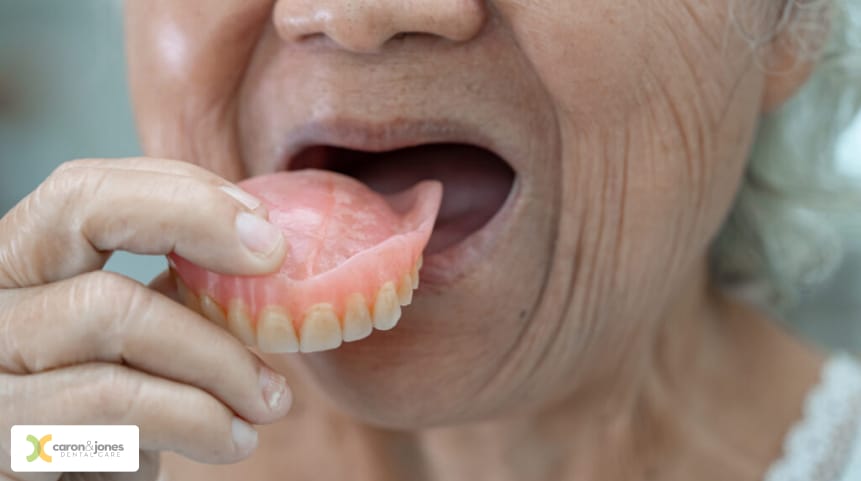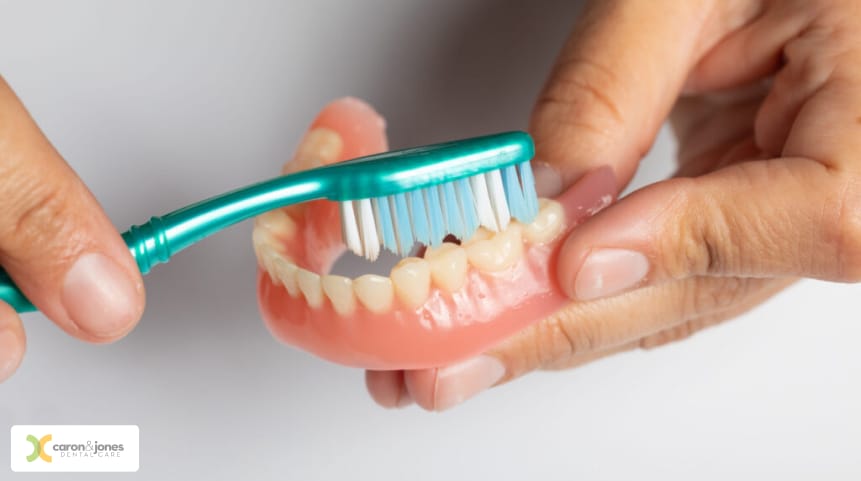Dentures remain one of the most popular and effective options for replacing missing teeth, but they’re often surrounded by outdated myths and misconceptions. If you’re considering dentures or already wearing them, you deserve accurate information about what modern dentures can offer.
Let’s bust some common myths that might be preventing you from enjoying all the benefits of today’s advanced denture solutions.

Myth #1: Dentures Last Forever
Contrary to popular belief, dentures actually aren’t permanent solutions. Most need replacement every 5-10 years due to natural wear and changes in your mouth.
Daily wear and tear gradually affects dentures as chewing creates micro-abrasions on their surfaces. These tiny imperfections become hiding spots for bacteria and stains, while the denture materials themselves deteriorate from constant exposure to saliva and oral bacteria.
What many patients don’t realize is that your mouth continues to change after tooth loss. Without natural tooth roots stimulating your jawbone, it gradually shrinks through a process called resorption. This changing foundation means even perfectly crafted dentures eventually lose their proper fit.
Signs that your dentures may need replacement include difficulty with speaking or chewing, changes in facial appearance, oral discomfort, and persistent stains or odors. These indicators aren’t just inconveniences—they’re important signals that your dentures no longer provide the fit and function you need.
Regular denture assessments promote continued comfort, proper function, and a natural appearance—all important aspects of maintaining your confidence and oral health.

Myth #2: Dentures Look Fake and Obvious
Nope! Not anymore, at least. Modern dental technology has transformed dentures from the awkward, fake-looking teeth of the past into natural, personalized smiles.
Today’s dentures use advanced materials that mimic natural enamel’s translucency and color variations. These high-grade porcelains and acrylics reflect light naturally, eliminating that flat, artificial appearance that once gave dentures away.
What makes modern dentures truly remarkable is customization. For example, at our dental office Kokomomo, IN, Dr. Caron and Dr. Jones design them specifically for your face, considering your unique features and even personality. Teeth aren’t arranged in perfect rows but are positioned with natural variations in alignment. Colors blend multiple shades rather than uniform white, with subtle gradients that mimic natural teeth. Even the gum portion features varying pink tones that seamlessly integrate with your own tissue.
Our patients’ experiences tell the story best. One, who once hid her smile in photos, now confidently shows her dentures that even her family can’t detect. Another, who delayed getting dentures, fearing they’d look unnatural, now wishes he hadn’t waited.
Modern dentures restore more than function—they return the natural appearance of your smile and the confidence that comes with it.
Myth #3: You Can’t Eat Normally with Dentures
Many new denture wearers worry they’ll need to say goodbye to their favorite foods. While there is an adjustment period, most people can return to eating nearly everything they enjoyed before.
Initially, softer foods work best while you adapt—pasta, fish, eggs, well-cooked vegetables, and ground meats provide excellent nutrition without challenging your new dentures. As you gain confidence, gradually reintroduce more challenging foods, cutting them into smaller pieces when necessary.
Effective chewing techniques make a significant difference. Start with small bites and chew slowly using both sides of your mouth simultaneously to prevent dentures from tipping. Place food evenly on both sides rather than only in front, and be cautious with extremely hard or sticky foods that might dislodge dentures.
Denture adhesives provide valuable stability when needed. Today’s adhesives are far more effective than older products, creating a strong seal that prevents shifting while eating. They come in various forms—creams, powders, strips, and cushions—so you can find the option that works best for your specific needs.
For those seeking maximum stability, implant-supported dentures offer a game-changing solution. By anchoring dentures to dental implants surgically placed in the jawbone, they eliminate slipping entirely. Implant-supported options provide up to 90% of natural chewing efficiency compared to about 30-50% with conventional dentures, allowing you to bite into apples, corn on the cob, and steaks with confidence.
Adjusting to eating with dentures typically takes 2-3 weeks, though comfort continues improving for several months. With proper fit, smart food choices, and the right techniques, most denture wearers return to enjoying nearly all their favorite foods with confidence.

Myth #4: You Don’t Need Regular Dental Visits with Dentures
Many denture wearers mistakenly believe that saying goodbye to natural teeth means saying goodbye to their dentist. This dangerous misconception can lead to serious oral health issues.
Regular dental visits remain essential for monitoring more than just your dentures. Your dentist checks for oral cancer, fungal infections, and other conditions that affect denture wearers. They examine your gum tissue, jawbone, and any remaining teeth that support partial dentures.
These checkups also ensure your dentures continue to fit properly. As your mouth naturally changes over time, even well-made dentures need adjustments to maintain comfort and function. Ill-fitting dentures can cause painful sores, difficulty eating, and speech problems.
Professional monitoring helps prevent common complications like denture stomatitis, a painful inflammation that frequently affects long-term denture wearers. Left unchecked, poor-fitting dentures can accelerate bone loss in the jaw, permanently altering your facial structure and making future denture fittings more difficult.
Professional denture cleanings remove stubborn buildup that home cleaning might miss. Your dentist can also identify early signs of wear and damage that could lead to breakage, potentially saving you from emergency repairs.
Most dentists recommend visits every six months, just as they would for patients with natural teeth. Some may suggest more frequent visits when you first receive dentures or if you have specific oral health concerns. These regular appointments ensure your dentures continue functioning properly while protecting your overall oral health.

Myth #5: Denture Care Is Complicated and Time-Consuming
Maintaining dentures is actually straightforward and takes just minutes each day. A basic cleaning routine involves rinsing after meals, daily brushing with a soft denture brush, and overnight soaking.
Modern cleaning products have simplified denture care significantly. Specialized denture cleansers come in convenient tablet form—just drop one in water with your dentures for a thorough clean. Ultrasonic cleaners offer an even easier option, using sound waves to remove stubborn deposits without scrubbing.
Proper overnight storage keeps dentures clean and helps maintain their shape. Simply place them in a cleaning solution or plain water. This prevents drying out, which can lead to warping, and allows them to be fresh for morning wear.
Time-saving tips include keeping cleaning supplies together in a designated area, using travel kits for on-the-go maintenance, and establishing a consistent routine. Quick daily care prevents buildup that would require more intensive cleaning later.
With these simple practices, denture maintenance typically requires less than five minutes daily—comparable to natural tooth care but without flossing!
Myth #6: Dentures Are Only for the Elderly
Yes, many elderly people do wear dentures due to age-related tooth loss, but, no, they’re not ONLY for the elderly. Dentures serve patients across all age groups. In fact, the average range people get their first set of dentures is actually between the ages of 40-49
Younger patients may need dentures for various reasons: severe periodontal disease, which can affect adults in their 30s; traumatic injuries from accidents or sports; genetic conditions affecting tooth development; and complications from medical treatments like radiation. Some younger patients choose dentures as an affordable solution when extensive dental work becomes financially prohibitive.
Dentures support overall health regardless of age. They restore proper chewing function, which is crucial for nutrition and digestive health. They maintain facial structure by preventing the collapsed appearance that occurs after tooth loss. And they protect remaining teeth from excessive pressure and shifting that can lead to further dental problems.
The confidence benefits transcend age barriers. A 25-year-old who receives dentures after a car accident regains their smile and speech clarity just as meaningfully as a 75-year-old. Many younger denture wearers report that modern, custom-fitted appliances have transformed their social lives and career opportunities by restoring their confidence in professional and personal interactions.
Dentures are simply prosthetic replacements for missing teeth—a dental solution for people of any age who need to restore function and appearance. The right denture solution is determined by your specific needs, not your birth certificate.
Myth #7: Adjusting to Dentures Is a Nightmare
There’s some patience needed, for sure, but it’s far from the nightmare many people fear. Most patients adapt within 2-4 weeks, with comfort improving steadily throughout this period.
Expect some initial soreness and increased saliva as your mouth adjusts to the new appliance. Speaking and eating might feel awkward at first—this is normal and temporary. Start with soft foods, cut into small pieces, and gradually reintroduce more challenging items as you gain confidence.
To speed adaptation, practice reading aloud to improve speech, use denture adhesive for added stability and maintain a positive attitude. Small, frequent adjustments from your dentist can address pressure points before they become painful sores.
Common challenges include gag reflexes, which usually diminish within days; speech changes that improve with practice; and temporary discomfort that resolves with minor adjustments. Persistent issues warrant a dental visit—don’t attempt to modify dentures yourself.
Professional support significantly eases this transition. Your dental team can make precise adjustments, recommend products for specific issues, and provide reassurance during the adaptation process. Follow-up appointments make sure your dentures function properly and remain comfortable as your mouth adjusts.
With realistic expectations and proper support, most patients find the adjustment period manageable and well worth the restored function and confidence dentures provide.
Your New Smile Awaits
Modern dentures have come a long way, offering comfort and natural looks that might surprise you. Whether you’re dealing with tooth loss from aging, injury, or health conditions, today’s options can be tailored just for you.
Now that you know the truth behind these common myths, you can feel confident about choosing dentures as a solution. Stop by our office to chat about how we can help restore your smile and get you back to enjoying life to the fullest!
